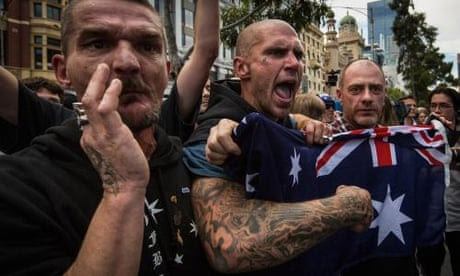http://www.theguardian.com/
Yassir Morsi
Reclaim Australia’s rallies weren’t a reaction to a real ‘threat’ from Islam. On the contrary, Islamism gives racists a convenient vocabulary for their grievances
 ‘Muslims, as 2% of the population, possess little by way of political power, have no significant representation, and own no capacity to impose their will.’ Photograph: Richard Ashen/Demotix/Corbis
‘Muslims, as 2% of the population, possess little by way of political power, have no significant representation, and own no capacity to impose their will.’ Photograph: Richard Ashen/Demotix/Corbis
the guardian UK
'Reclaiming Australia' from Islam is really about reclaiming whiteness
Reclaim Australia’s rallies weren’t a reaction to a real ‘threat’ from Islam. On the contrary, Islamism gives racists a convenient vocabulary for their grievances
 ‘Muslims, as 2% of the population, possess little by way of political power, have no significant representation, and own no capacity to impose their will.’ Photograph: Richard Ashen/Demotix/Corbis
‘Muslims, as 2% of the population, possess little by way of political power, have no significant representation, and own no capacity to impose their will.’ Photograph: Richard Ashen/Demotix/Corbis
There are no Islamic courts, no practice of its jurisprudence, no laws from the Quran, and yet on Saturday we saw Reclaim Australia rally violently, their placards demanding the country say “No to Sharia!”
Seeing barricades, lines of mounted officers, rivals groups brawling over the truth of the “Islamification” of Australia, is a little overblown when we consider that Muslims, as 2% of the population, possess little by way of political power, have no significant representation, and own no capacity to impose their will.
The Muslim-Australian is hardly a political threat to the nation, and Muslims themselves continue to struggle with the scrutiny applied to them as part of the continued war on terror.
So while we could dismiss the Reclaim movement as paranoid and ignorant, I refuse to see racism as a natural response, like an immune system, to presence of a “real” threat. We need to recognise the powerful feeling of “owning the nation” that comes with white Australia saying “no” to foreigners.
Reclaim’s sentiments come from a social imaginary of Australia under attack, which is inundated with images of a violent Islam. But it’s not that racism is the result of the “presence” of Islamism. It is that Islamism gives racism its convenient vocabulary.
Ordinary people can imagine the erosion of their social surroundings in everyday terms of stories and images that are fed to them in an exaggerated form, of an existential fight between us and them over who owns even the minutiae of life: where we live, the languages we speak and, in the case of the halal certification “debate”, what we eat.
The beleaguered “community” increasingly becomes formed by these fantasies, fears, symbols, caricatures, stereotypes and nightmares. Racism then defaults to a kind of commonsense language, a no-bullshit bypass of political correctness. The community is provoked by a threatening Muslim, a foreigner whose presence is drenched in images of the inhuman violence we see circulated every day, and who is presumed to have an Asiatic capacity for cruelty and violation.
The Muslim as society’s folk devil is no mere illusion or fantasy. It represents deep-seated anxieties about control, displaced on to an Islam that has come to represent symbolically a sense of traditional loss and struggle in a changing global and multicultural world.
Any contest over what is “obvious” about Islam or “real” about Islamism, or whether Muslims need “fixing”, however, misses the point. The Reclaim Australia rallies were never about Islam in the first place, but were a clash of different ideas about being Australian.
Racism is rarely about the reality of the other.
Racism is rarely about the reality of the other; the Reclaim protestors, without irony or self-reflection, were able to appropriate the Indigenous flag in their cry to reclaim Australia.
With the presence of swastika tattoos, and the general demography of the rally’s participants, it is obvious that race still remains central to our political culture in a constitutive sense; being “white” continues to play a formative role in how we construct what it means to be authentically Aussie.
For some, Aussie still simply means “white”, a sentiment that itself obscures the mostly forgotten English bigotry against the Irish, Australia’s first other.
These days the un-Australian is commonly a figure of colour, who is easily transmittable from one ethnic identity to another. The foreigner as a “form” always remains a thing to respond to, even as we openly acknowledge that, in Australia’s history, its content has always been interchangeable: Asian, African, Arab, Muslim – and yet, always Indigenous.
The foreigner is a piñata doll, the thing you beat so you can still feel you own a stick. It’s a thing to say “no” to, a thing whose integration is to be always measured against “our” standard and in doing so making that standard feel more real than it is.
In these cacophonies of “no” to foreignness, the foreigner is contradictory, fragmentary by its nature. Its truth is secondary to its function as a crude shorthand for the negating of difference and change.
No sensible adult could think Australia is becoming Islamic, and Reclaim Australia has little to do with halal, sharia, jihad or terrorism. These words are like traumas, a backdrop against which the repressed frustration of losing privilege plays out.
Yet despite official denunciation and celebration of diversity, racism as a concept in this country endures, adapting and readapting, chameleon-like to the changing social and political times. It does so because its aim, in part, is to address the sensitive needs of the dominant white nation’s sense of self.
---

No comments:
Post a Comment